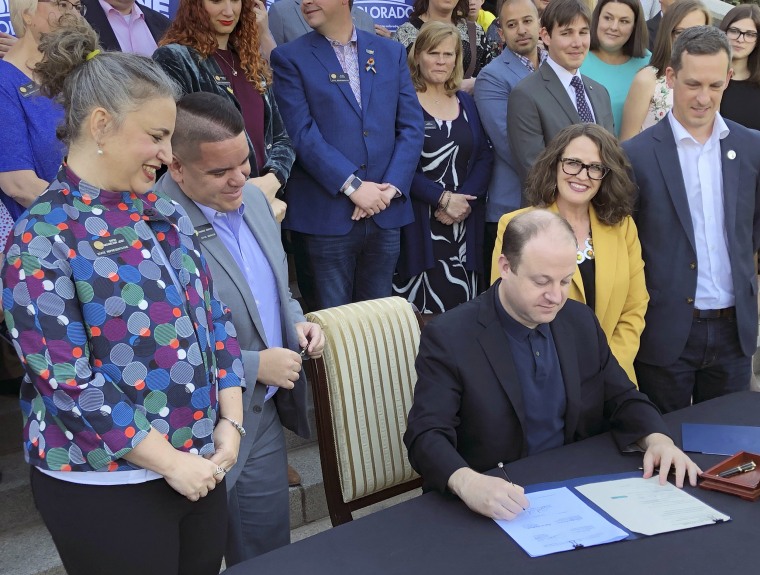Thousands of Teens Spared Conversion Therapy Due to State Bans, Report Finds
An estimated 10,000 LGBTQ youth, ages 13 to 17, have been protected from conversion therapy by living in states that have banned the contentious practice on minors, according to an updated report from UCLA’s Williams Institute.
Starting in 2012 with California, 18 states and the District of Columbia have banned conversion therapy for those under 18, though no state bans the practice on adults. Conversion therapy seeks to change the sexual orientation or gender identity of an individual through various tactics including talk therapy, and, in extreme cases, aversion treatments like inducing nausea or vomiting.

“The scientific research since the late 1940s has been remarkably consistent that sexual orientation and gender identity are remarkably resistant to efforts to change,” Catherine Lugg, a professor at the Graduate School of Education at Rutgers University, told NBC News.
“Since the 1970s, no credible medical organization has claimed that one can change — or, by implication, should change — their sexual orientation and/or gender identity,” Lugg added.
In fact, the vast majority of the general population does not support conversion therapy on lesbian, gay, bisexual, transgender and queer youth. The Williams Institute reports 18 percent of those surveyed this year believe the practice should be legal for minors, with 56 percent believing it should be illegal, and the remaining 26 percent not sure.
Yet, 32 states haven’t banned the practice, and 16,000 young people in those states are expected to undergo conversion therapy from a licensed health care professional before reaching the age of 18, according to the report.
Related
Another Pride surprise: Biden visits Stonewall
The negative mental health outcomes caused by the medically discredited practice may affect young people for the rest of their lives, expert say. This month, The Trevor Project, a nonprofit that helps LGBTQ youth in crisis, released its 2019 National Survey on LGBTQ Youth Mental Health, which found that 42 percent of LGBTQ youth who underwent conversion therapy reported a suicide attempt in the last year. That number was even higher (57 percent) when looking specifically at transgender and nonbinary youth who’ve undergone the practice in the past 12 months.
Sam Brinton, the project’s head of advocacy and government affairs, underwent conversion therapy as a minor. Brinton told NBC News that “the real and lasting effects of it are too awful to list and mention.”
Brinton said conversion therapy gives vulnerable LGBTQ youth “false hope” that they can actually change their sexual orientation or gender identity. Being unable to do so then leads to “massive mental health challenges such as depression and suicidal ideation,” Brinton added.
While 13 states have banned conversion therapy on minors in the past two years alone — roughly one state every two months — Brinton expects this pace to slow, noting that the remaining states lean more conservative.
“But that doesn’t mean we don’t try,” Brinton added, noting that an additional 21 states — including reliably conservative Kansas, Kentucky and Georgia — have already submitted bills that would ban the discredited practice for minors.
Related
WATCH: “Stonewall 50: The Revolution”
In fact, The Trevor Project is leading the 50 Bills 50 States campaign, which works to get legislation passed in every state that would ban conversion therapy on minors.
Brinton, however, does not believe legislation alone will end the controversial practice. The key, Brinton said, is making clear to providers that practicing conversion therapy is no longer lucrative.
That’s why Brinton says the recent bill introduced by Rep. Sean Patrick Maloney, D-N.Y., which seeks to ban taxpayer funding of conversion therapy, is a step in the right direction. Currently, states decide which services Medicaid can cover, and Medicaid doesn’t require a detailed description of the services provided, meaning practices like conversion therapy — which has been discredited by nearly every major health organization — can simply be billed and covered like traditional therapy.
While Brinton was not able to provide an exact number, The Trevor Project tracks close to 500 known conversion therapists and claims “millions of dollars” are currently going into the pockets of these providers.
Brinton made clear it’s necessary to remind LGBTQ youth — especially those being pushed into something like conversion therapy — that they are not alone.
“I remember feeling I was alone, and I was literally so worthless that I was being erased by a doctor,” Brinton recalled. “This is the best time for us to tell them, ‘You’re not alone, and we’re fighting for you in every state across the country.’”